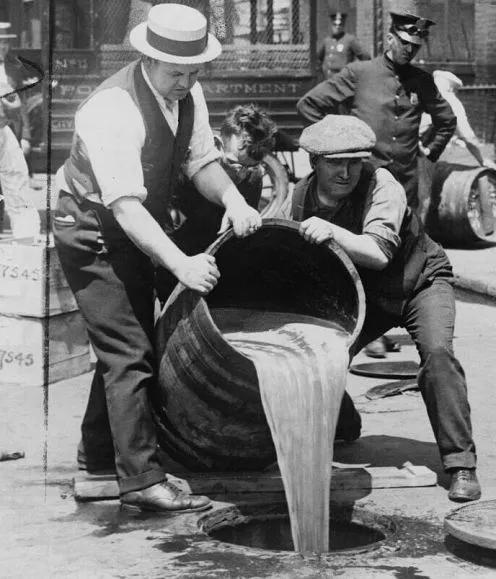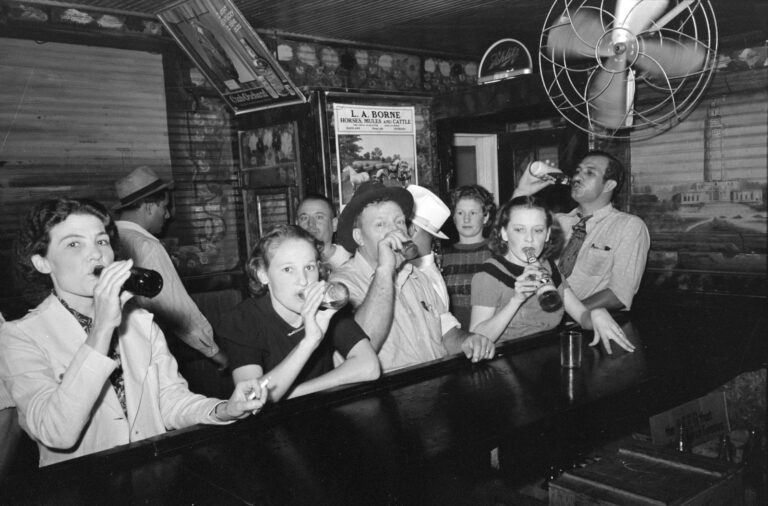
The Eighteenth and Twenty-First Amendments
The Eighteenth and Twenty-First Amendments, which enforced and repealed prohibition in the United States, were ratified on January 16, 1919 and December 5, 1933.
After one year from the ratification of this article the manufacture, sale, or transportation of intoxicating liquors within, the importation thereof into, or the exportation thereof from the United States and all territory subject to the jurisdiction thereof for beverage purposes is hereby prohibited.
Prohibition in America
The Eighteenth Amendment was ratified on January 16, 1919, and prohibited the making of, sale, or transportation of alcohol. The amendment came as a result of roughly a century of reform movements. Early temperance advocates aimed to reduce alcohol consumption and prevent alcoholism, drunkenness, and the disorder and violence it could result in. Theses early efforts promoted temperate consumption with hopes for eventual prohibition.
By the mid 1830s, over 200,000 people belonged to the American Temperance Society. Many of the most prominent proponents of temperance were women, seen as the more virtuous sex and responsible for children’s moral education. Lacking in rights and protections, women were also frequently those most affected by the symptoms of alcoholic family members.
By the late 1800s, support for prohibition was strong, particularly amongst progressives who favored social reform and a greater nationwide morality. The Anti-Saloon League, backed by many women and Protestants, was a driving force in abolishing alcohol manufacture. After a temporary wartime prohibition to save grain during World War I, the Eighteenth Amendment was submitted by Congress for state ratification. It was quickly ratified within a year and would stand as law for the next 13 years.
Full texts on ContextUS
The Twenty-First Amendment, which repealed the Eighteenth Amendment, was ratified on December 5, 1933. The decision to repeal a constitutional amendment was unprecedented and came as a response to the crime and general ineffectiveness associated with prohibition. The Twenty-First Amendment also has the distinction of being the only amendment ratified, not by state legislature, but by state ratifying conventions.
Despite the continued strength of the temperance lobby, prohibition had lost its popular support by 1933. Though it had reduced alcoholism and drunkenness, it had also created new problems in lawlessness and fortified the system of organized crime. A black market for alcohol sprung up quickly after prohibition went into effect, especially within the mob, and alcohol remained easily accessible to citizens willing to visit a speakeasy or make it themselves. Organized crime members made so much money on liquor that they were able to bribe police forces, accomplishing non- and selective enforcement of the law. Whether favorable towards prohibition or not, citizens were alarmed by a breakdown in the rule of law. The Great Depression, and a resulting economic need for tax revenue and jobs, also influenced desires for a legal alcohol industry.
In the years after ratification, the Twenty-First Amendment was interpreted as giving states the authority to regulate their own prohibitory practices. For this reason, our modern-day policies vary across the country.
The Congress and the several states shall have concurrent power to enforce this article by appropriate legislation.
This article shall be inoperative unless it shall have been ratified as an amendment to the Constitution by the legislatures of the several states, as provided in the Constitution, within seven years from the date of the submission hereof to the states by the Congress.
More resources on the Eighteenth and Twenty-First Amendments
The eighteenth article of amendment to the Constitution of the United States is hereby repealed.
Alcohol in America and Prohibition
Commentary and articles from JMC Scholars
- Sean Beienburg, “Prohibition, the Constitution, and States’ Rights”
- Michael Munger (co-author), “The Prohibition-Repeal Amendments: A Natural Experiment in Interest Group Influence”
- Diana & Michael Thomas, “Rational Irrationality and the Political Process of Repeal: The Women’s Organization for National Prohibition Reform and the 21st Amendment”
- Kyle Volk, “What if the Fourth of July were Dry?”
The transportation or importation into any state, territory, or possession of the United States for delivery or use therein of intoxicating liquors, in violation of the laws thereof, is hereby prohibited.
Commentary and articles from JMC Scholars
The Progressive Era: Prohibition in Context
Gwendoline Alphonso, “Hearth and Soul: Economics and Culture in Partisan Conceptions of the Family in the Progressive Era, 1900-1920.” (Studies in American Political Development 24.2, October 2010)

Samuel DeCanio, Democracy and the Origins of the American Regulatory State. (Yale University Press, 2015)
Stephen Engel (editor), The Progressives’ Century: Political Reform, Constitutional Government, and the Modern American State. (Yale University Press, 2016)
Rogers Smith, “The Progressive Seedbed: Claims of American Political Community in the 20th and 21st Centuries.” (The Progressives’ Century: Political Reform, Constitutional Government, and the Modern State, Yale University Press, 2016)
This article shall be inoperative unless it shall have been ratified as an amendment to the Constitution by conventions in the several states, as provided in the Constitution, within seven years from the date of the submission hereof to the states by the Congress.
